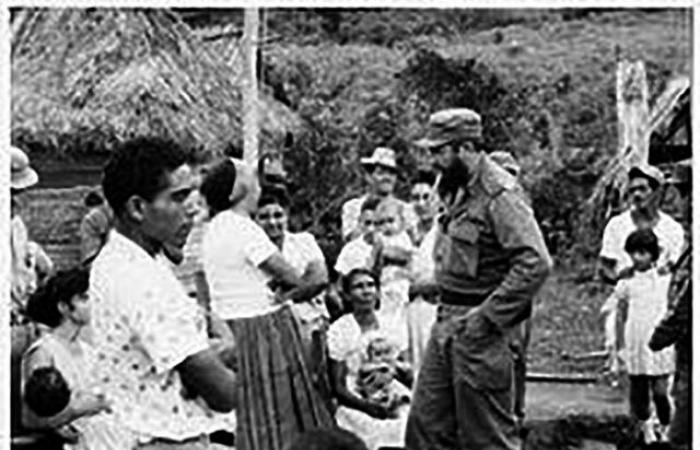An important event occurred in Baracoa on June 21 and 22, 1959, just over five months after the triumph of the Revolution: the First Municipal Peasant Congress.
That historic event, which has been celebrating 65 years, allowed for the rapprochement and consolidation of peasant organizations, and indicated the route to be followed by the people of Baracoa, support for the Agrarian Reform, and other laws proclaimed up to that time and for the Revolutionary Government headed by the then Prime Minister, Dr. Fidel Castro.
It is fair to appreciate that that unitary conclave, in which 146 delegates from 75 grassroots organizations participated, had as a precedent the contribution of the Baracoa peasantry to the victory of the Revolution, expressed in their participation in the First Peasant Congress in Arms, on December 21. September 1958, in Soledad de Mayarí Arriba.
In the territory liberated by the Second “Frank País” Front of the Rebel Army, a hundred peasants belonging to various bases in Guantánamo, Baracoa, Alto Songo, Yateras, Sagua de Tánamo, Mayarí, and other towns, participated in the event that marked the beginning of the Agrarian Revolution in Cuba.
The commitment of the Baracoa peasants to the conclave held in the midst of the insurrection can be seen from the “[…]three days of horseback riding, to participate […]”, according to the then Commander Raúl Castro Ruz, head of the Second Front, in a passage from the book “En Marcha con Fidel-1959”, by Antonio Núñez Jiménez.
Within the Executive Committee of that First Peasant in Arms Congress, the Baracoa delegates Nemesio Viquillón Frómeta and Marcelino Cala Ramírez appeared as members.
Cuban Revolution in power
With the revolutionary triumph of January 1, 1959, a process of reorganization and constitution of peasant associations and committees was immediately developed throughout the country.
Immediately, the Municipal Peasant Management Committee “Félix Lugerio Pena Díaz” was created in the First City, in charge of organizing the First Peasant Congress, convened for June 21 and 22, 1959.
The new call to support the Revolution made to the Baracoa peasantry included an agenda containing topics such as: “[…] the Agrarian Reform Law, the discussion of the work report carried out, the reading and approval of the Municipal Regulations, the Constitution of the Municipal Association and the election of the Executive that would work to achieve all the peasant demands of the moment.
That achievement is an example that in the First City of Cuba, the flag of unity raised by the then established Provincial Peasant Association of the East “Frank País” was kept high.
At the Peasant Congress in Baracoa, chaired by Rebel Army Captains Tony Pérez and Jorge Enrique Mendoza, respective members of the Agrarian Bureau and INRA in the East, the peasants “They discussed the importance of the medical tours they were carrying out in different areas to combat the parasitic diseases that were rife, the need to maintain credit to coffee growers and the urgent need for People’s Stores in places like Gran Tierra, Puriales de Baracoa, Monte Cristo and others.”
Agreements were adopted, among others, in relation to the main issues and evils of great incidence at that time, being the prelude to the future perspective of the country, in the search for solutions to problems of such magnitude as the Agrarian Reform, from the large number of census takers, and farms of large landowners that had not been intervened and distributed.
The election of the municipal Executive Committee of Baracoa was an exponent of the unity and maturity of the selected peasants, all with trajectories in the organization of the movement, in the armed insurrectional struggle against tyranny.
This executive has under its command the eight thousand peasants grouped in 76 associations, who, as agreed, will defend the triumphant Revolution and the Agrarian Reform, even with their lives if necessary.
The closing of the Peasant Congress in Baracoa ratified the absolute support for the decisions taken. Nearly a thousand peasants, together with the glorious young people of the Rebel Army, marched first from the Mabujabo Peasant Training School (today Rubert López Basic Secondary School), to the city of Baracoa, and in a second moment they gathered in a public event in front of the headquarters of today’s Municipal Government with nearly eight thousand people.
Captain Carlos Lahite, of the Rebel Army, summarized the event:“He highlighted the role of the new peasant organizations, the actions carried out by the revolutionary government in favor of the peasants and the people, calling for maintaining strong revolutionary vigilance, to prevent elements enemies of the Revolution, sneaking into the peasant movement, from being able to use this for your attacks”.


